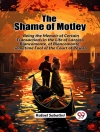G. P. R. James’s 'Henry Smeaton’ is a historical novel set against the backdrop of the turbulent political landscape of 16th century England. The narrative intricately weaves themes of loyalty, betrayal, and the complexities of personal honor, exploring the life of its titular character—a young man caught in the crosshairs of shifting allegiances and the conflicts ignited by the monarchy. James employs a rich, descriptive prose style that evokes the era’s ambiance while skillfully presenting psychological depth and moral dilemmas that resonate with contemporary readers. The novel fits within the Romantic literary tradition, showcasing an appreciation for both individual experiences and idealized notions of heroism and honor. G. P. R. James (1801-1860) was an English author whose connections to the historical context of his works are noteworthy. His extensive travels and engagement with various literary forms helped him to capture the nuances of historical settings. His background in law and politics, combined with an interest in cultural narratives, influenced his storytelling and allowed him to forge vivid characters that serve as archetypes of broader societal themes. Readers interested in nuanced historical fiction that balances character-driven storytelling with a rich sense of time and place will find 'Henry Smeaton’ immensely rewarding. James invites his audience to reflect on the moral complexities of honor and loyalty, making this work relevant beyond its historical context. A must-read for enthusiasts of Romantic literature and historical narratives alike.
O autorze
George Payne Rainsford James, an eminent English novelist and historical writer, was born on August 1799 in London, England. He embarked on a prolific writing career, marked by a unique blend of history with fiction, making significant contributions to the early 19th-century literary scene. Educated at the Royal Naval College, James forged close ties with eminent personalities of his time, including Sir Walter Scott, who greatly influenced his literary pursuits. He penned an impressive collection of over 90 novels, with a particular emphasis on historical narratives that often featured the chivalric themes of honor, love, and adventure. One notable work among his extensive repertoire is 'Henry Smeaton’—a captivating historical novel that delves into the tumultuous periods of England’s past through the eyes of its eponymous hero. James’s literary style is characterized by meticulous historical research, elaborate scenic descriptions, and a genteel prose that invites readers to immerse themselves in the lives and societies of bygone eras. His narratives, while rooted in the historical context, explore timeless human emotions, making his works a bridge between the annals of history and the art of storytelling. Though his popularity waned towards the end of his career, G. P. R. James remains an important figure in the canon of historical fiction, with his works continuing to be a point of reference for scholars interested in the genre’s development.












